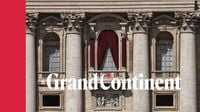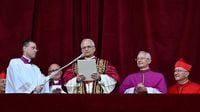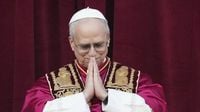The conclave in the Vatican has elected Cardinal Robert Francis Prevost as the new Pope, who has taken the name Leo XIV. This historic election marks a significant moment as Prevost becomes the first Pope from the United States, succeeding Pope Francis, who passed away just 17 days prior. The announcement came after a swift conclave that lasted only one day and 23 minutes, culminating in the appearance of white smoke at 18:07 hours.
Born on September 14, 1955, in Chicago, Illinois, Prevost has a rich background that intertwines American and Peruvian cultures. His parents, Louis Marius Prevost and Mildred Martínez, instilled in him a deep faith that led him to the Augustinian seminary. He graduated in Mathematics and Philosophy from Villanova University in 1977 and was ordained a priest in Rome in 1982. He later obtained a doctorate in Canon Law from the Pontifical University of Santo Tomás de Aquino.
Prevost's journey in the Church took a pivotal turn when he was sent to Peru as a missionary in the 1980s. He dedicated over a decade to serving in the impoverished regions of Piura and Trujillo, where he held various roles including teacher, parish priest, and judicial vicar. He often reflected on his time in Peru, stating, “The Gospel is lived with bare feet and an open heart.” His experiences there shaped his pastoral approach, emphasizing humility and service.
Upon returning to the United States, Prevost rose through the ranks of the Augustinian Order, serving as Prior Provincial in Chicago and later as Prior General from 2001 to 2013. In November 2014, he was appointed Apostolic Administrator of Chiclayo by Pope Francis, a role he maintained until 2023 when he became the Prefect of the Dicastery for Bishops and the President of the Pontifical Commission for Latin America. His elevation to cardinal took place on September 30, 2024, solidifying his influence within the Church.
In his first address as Pope, Leo XIV emphasized themes of inclusion, peace, and dialogue. He stated, “Peace be with you all,” and stressed the necessity for the Church to be a bridge-builder in a world filled with division. His episcopal motto, “In Illo uno unum” or “In that one, we are one,” reflects his commitment to fostering unity within diversity. He noted the importance of a missionary Church that listens and engages with the modern world.
Prevost’s election is seen as a beacon of hope for many Catholics who desire a Church that remains close to the people, much like his predecessor, Pope Francis. His dual nationality—American and Peruvian—positions him uniquely to address the diverse challenges facing the global Church today, from migration issues to the ethical dilemmas posed by artificial intelligence.
The conclave, which took place in the Sistine Chapel, was attended by 133 cardinals. The fourth voting session concluded with the announcement of the new Pope, marking a historic moment in the Church's leadership. Cardinal Dominique Mamberti, the Protodeacon, proclaimed, “Habemus Papam!” announcing to the world that they have a new Pope.
During his address, Leo XIV expressed gratitude towards Pope Francis, highlighting his predecessor’s commitment to social justice and care for the marginalized. He urged the faithful to work together in building a Church that is open and welcoming to all, particularly those in need. “We can be a Church that walks and seeks peace and charity,” he said.
Prevost’s past experiences have equipped him with a profound understanding of the Church's role in society. He has been vocal about the need for the Church to engage with contemporary issues, including the rights of women and the LGBTQ+ community, aligning with the progressive vision of Pope Francis. His election is viewed as a continuation of the reformative efforts initiated by his predecessor.
As Leo XIV begins his papacy, he will reside in the Casa Santa Marta, a residence that has become symbolic of a more humble papacy. His first public appearance was met with enthusiasm from the crowd gathered in Saint Peter's Square, where he called for a collective effort towards peace and understanding among all people.
In a heartfelt moment, he addressed his beloved diocese of Chiclayo in Spanish, saying, “A special greeting to my dear diocese of Chiclayo in Peru, where a faithful people have accompanied their bishop and shared their faith.” This connection to his roots in Peru underscores his commitment to serving the global Church while remaining grounded in his personal history.
As the world watches, Leo XIV's papacy is poised to navigate the complexities of a rapidly changing society. His leadership will be crucial in addressing pressing global issues while fostering a spirit of unity and compassion within the Church. With a rich background in pastoral care and a commitment to dialogue, he represents a hopeful future for many believers looking for guidance in these challenging times.
With his election, the Catholic Church enters a new chapter under the leadership of Leo XIV, who carries the weight of tradition while embracing the need for change. His journey from the streets of Trujillo to the Vatican is a testament to the transformative power of faith and service. As he steps into this monumental role, the faithful around the world await his guidance and vision for the Church in the years to come.



